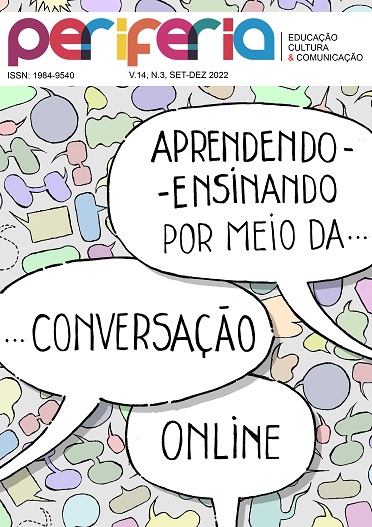CONVERSA COM NILDA ALVES
DOI:
https://doi.org/10.12957/periferia.2022.70591Resumo
Conversar – ‘práticateoriaprática’ que ocupa e organiza os ‘espaçostempos’ da vida cotidiana – é tida como metodologia nos projetos de pesquisa e extensão liderados pela professora Nilda Alves há muitos anos. Outros grupos de pesquisa associados também adotam as conversas em processos de pesquisa no campo da educação. Nessa entrevista, as interlocutoras conversam com Nilda Alves a respeito dessa metodologia e como mais recentemente a pesquisadora vem desenvolvendo suas pesquisas em conversas inspiradas por imagens, sons, outros sentidos e os cotidianos escolares. Nilda Alves é Professora emérita da UERJ (2022) e pesquisadora emérita da FAPERJ, com exercício na UERJ, no Programa de Pós-graduação em Educação (campus Maracanã) e no PPGE-Processos Formativos e Desigualdades Sociais (campus S. Gonçalo). Organizadora de livros, séries e coleções, com artigos publicados no Brasil e no exterior, trabalha em pesquisas com os cotidianos, articulando currículos, redes educativas, imagens, sons, formação de docentes e artefatos curriculares, na compreensão de que os processos educativos precisam ser compreendidos em suas múltiplas dimensões éticas, estéticas, políticas e poéticas.
Downloads
Publicado
Como Citar
Edição
Seção
Licença
Autores que publicam nesta revista concordam com os seguintes termos:- Autores mantém os direitos autorais e concedem à revista o direito de primeira publicação, com o trabalho simultaneamente licenciado sob a Creative Commons Attribution License que permitindo o compartilhamento do trabalho com reconhecimento da autoria do trabalho e publicação inicial nesta revista.
- Autores têm autorização para assumir contratos adicionais separadamente, para distribuição não-exclusiva da versão do trabalho publicada nesta revista (ex.: publicar em repositório institucional ou como capítulo de livro), com reconhecimento de autoria e publicação inicial nesta revista.
- Autores têm permissão e são estimulados a publicar e distribuir seu trabalho online (ex.: em repositórios institucionais ou na sua página pessoal) a qualquer ponto antes ou durante o processo editorial, já que isso pode gerar alterações produtivas, bem como aumentar o impacto e a citação do trabalho publicado (Veja O Efeito do Acesso Livre).







